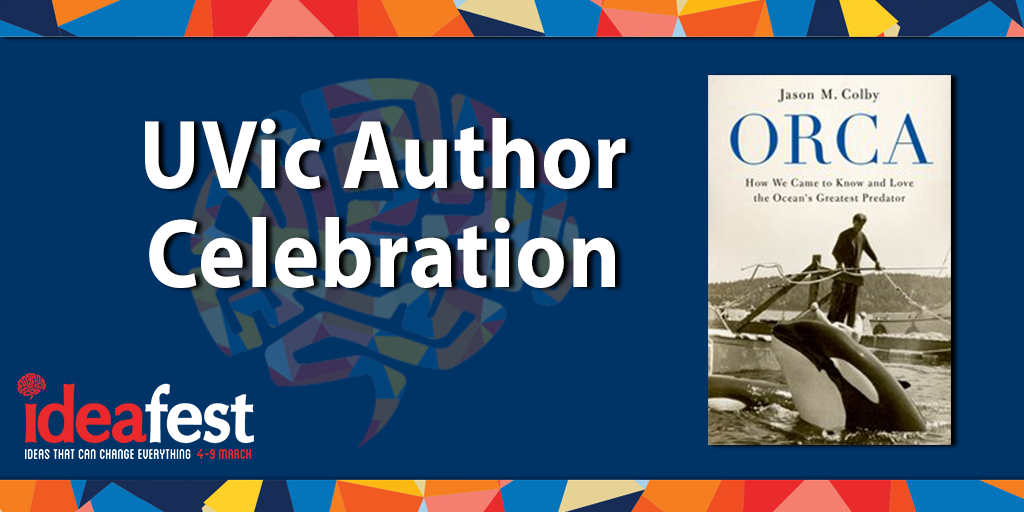The annual UVic Author Celebration is coming up as part of Ideafest. Join us as we celebrate authors from the UVic community who will read from their latest works.
When: March 7, 2019
Where: UVic Bookstore
Time: 2:00-4:00pm
The author panel includes: Jason M. Colby (History), Patrick Friesen (Writing), Bill Gaston (Writing), and Lynne Marks (History). Jim Forbes (Director of Campus Services) will host and Jonathan Bengtson (University Librarian) will moderate.
This week, we will highlight the books written by members of the author panel.
Orca: How We Came to Know and Love the Ocean’s Greatest Predator by Jason M. Colby was released by Oxford University Press in 2018.
About the Book
 Since the release of the documentary Blackfish in 2013, millions around the world have focused on the plight of the orca, the most profitable and controversial display animal in history. Yet, until now, no historical account has explained how we came to care about killer whales in the first place.
Since the release of the documentary Blackfish in 2013, millions around the world have focused on the plight of the orca, the most profitable and controversial display animal in history. Yet, until now, no historical account has explained how we came to care about killer whales in the first place.
Drawing on interviews, official records, private archives, and his own family history, Jason M. Colby tells the exhilarating and often heartbreaking story of how people came to love the ocean’s greatest predator. Historically reviled as dangerous pests, killer whales were dying by the hundreds, even thousands, by the 1950s–the victims of whalers, fishermen, and even the US military. In the Pacific Northwest, fishermen shot them, scientists harpooned them, and the Canadian government mounted a machine gun to eliminate them. But that all changed in 1965, when Seattle entrepreneur Ted Griffin became the first person to swim and perform with a captive killer whale. The show proved wildly popular, and he began capturing and selling others, including Sea World’s first Shamu.
Over the following decade, live display transformed views of Orcinus orca. The public embraced killer whales as charismatic and friendly, while scientists enjoyed their first access to live orcas. In the Pacific Northwest, these captive encounters reshaped regional values and helped drive environmental activism, including Greenpeace’s anti-whaling campaigns. Yet even as Northwesterners taught the world to love whales, they came to oppose their captivity and to fight for the freedom of a marine predator that had become a regional icon.
This is the definitive history of how the feared and despised “killer” became the beloved “orca”–and what that has meant for our relationship with the ocean and its creatures.
About the Author
Jason M. Colby is associate professor of environmental and international history at the University of Victoria. Born in Victoria, British Columbia, and raised in the Seattle area, he worked as a commercial fisherman in Alaska and Washington State. He is the author of The Business of Empire: United Fruit, Race, and US Expansion in Central America.
Praise for the Book
“This is an affecting book, personal and political all at once, and written by a scholar who has worked hard to recover and relay painful tales of the wild orcas that encountered humans and the humans that did the encountering. Nearly all those meetings began in panic and pain, most of it the whales’, though some of it that of the men who came to believe they were doing the wrong thing wresting these breathtaking animals from their world, to deliver them to our own–which has been changed by the resulting episodes of captivity and captivation.” — D. Graham Burnett, author of The Sounding of the Whale
“This fascinating history reveals what happens when humans became captivated by captive orcas. Colby poignantly locates the very origins of conservation in the tense, tender, and tragic relationships between humans and cetaceans. This finely textured social history of the Pacific Northwest opens up the story of how ‘killer whales’–once cast as deadly pests–became popular attractions and emotional, intelligent ‘orcas’.” — Daniel Bender, author of The Animal Game: Searching for Wildness at the American Zoo
“With Orca, Jason Colby takes readers on a riveting journey. In a matter of decades, the Pacific Northwest’s killer whales traveled from despised vermin to regional sweethearts. Their emotional passage revealed the true wildcard of wildlife management: navigating the swirling opinions of human populations. A timely book, Orca brings history to bear on a fraught relationship between two apex predators. Colby traces the rise in human affection for the whales but also the emergence of a cruel realization as audiences cheered captives’ performances in aquariums across the globe. Love and fandom could kill and maim as efficiently as fear and contempt. In the end, it’s unclear whether orcas benefited from the connection they forged with people.” — Jon Coleman, author of Vicious: Wolves and Men in America

